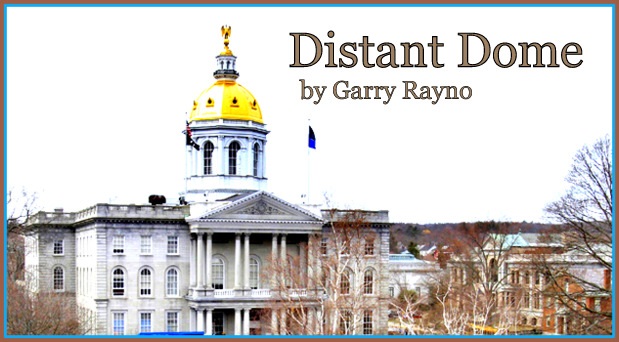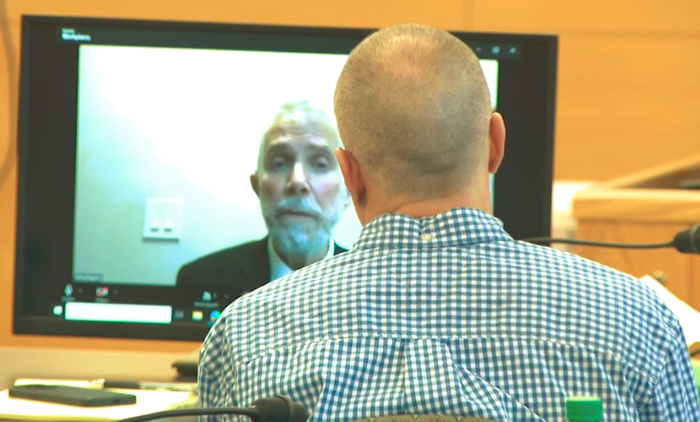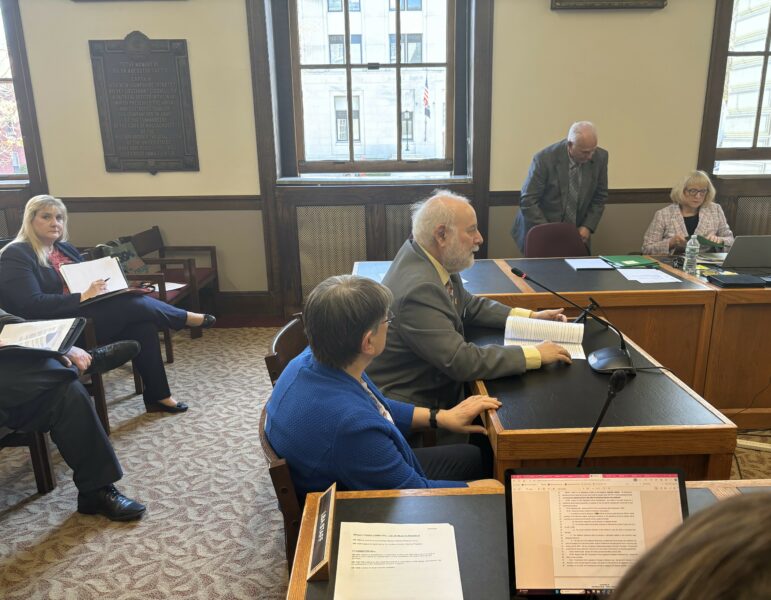InDepthNH.org and Manchester Ink Link co-publish Distant Dome
By GARRY RAYNO,
Distant Dome
CONCORD – The state’s new two-year operating budget will define this two-year legislative session more than any other bill or issue.
The federal one-year operating budget, which have been as rare as compromise in Washington, likewise defines a Congress’s work for its two years.
State and federal budgets have been in the news this week as the Senate Finance Committee finished work on its $11.8 billion two-year budget plan and President Donald Trump released his spending plan for fiscal 2018.
Budgets contain just two things: revenues — taxes and fees — and spending, and in New Hampshire they have to be balanced when they are approved, although that is obviously not true in Washington.

Garry Rayno
But budgets are much more than numbers. The numbers tell the story of a state’s response to a growing opioid addiction epidemic, a failing mental health system, how the elderly are treated and if a state values public education for its students.
More than numbers
Budgets are also used to attract businesses and tourists, favor a certain commercial segment or prop up an industry like logging which is on the downside of its economic cycle like textiles factories 90 years ago.
Different political philosophies produce alternative views of what should be in a budget or what government should do and what it should not.
With the rush backwards to make “America Great Again” many see social programs as the purview of non-profit organizations like Easter Seals, the Red Cross and churches and not government, while others see government as the safety net for the poor, elderly, disabled and sick.
Most agree government ought to oversee highways, air travel, national security and defense, but how to pay for those services is less agreeable.
Labels, catchphrases
The disagreements over government and what it should do have been turned into slogans and talking points to make their case.
“Tax and spend liberals” was a catchphrase Republicans used to define Democrats who in turn accused their legislative counterparts of being “slash and burn” and “heartless.”
From a general political prospective, Democrats focus on spending and Republicans on revenues but that does not paint the real picture.
Good people who inhabit both sides of the aisle want to do what is best for their state or country, but more often the voices of the ideologues on either side drown out the debate.
Political philosophy and how you spin the next election cycle overrides the greater good in today’s political environment.
Government’s responsibility
What is lost in the heated partisan battles over pocketbook issues is what government really is. Government provides services from national defense and national parks to feeding the poor and health care for children.
So when someone talks about “making government smaller” they are willing to reduce those services to segments of the population and businesses. You cannot escape that despite the promises.
Whether the services are a safety net for the poor or contracts for fighter jets, people currently receiving government help or funding will be hurt.
In New Hampshire, government spending was slashed during the 2011-12 session when state aid to the university and community college systems was cut in half and some social service programs were eliminated like Children in Need of Services or CHINS.
State college tuition skyrocketed making a college education at Durham, Plymouth, Keene or Manchester impossible for hundreds if not thousands of state students. It also enticed many students to leave New Hampshire for cheaper out-of-state institutions.
The CHINS program was a court driven system targeting at-risk students who cut classes or skipped school, had behavior problems or experimented with alcohol or drugs.
The at-risk student would go before a judge who would hear the case and then determine what services the child would receive to help change behavior, including spending some time at the Youth Detention Center.
Saving money or saving teens
The idea was to reach the at-risk students before they become adult criminals and before they become a real expense to the state.
With budget writers looking to save money, the $4 million or $5 million program looked like something schools and local police could handle.
But the outcry from police, parents and schools during the next two years made lawmakers reinstate the program although courts would not determine the services a child would receive.
Instead the Department of Health and Human Services, which pays for the program, now decides how best to help the child.
On the revenue side of the budget, with very few exceptions, taxes and fees have not risen in the last decade. The exceptions are the gas tax, which was long overdue, with the last increase in 1991, and the cigarette tax.
Over the last few budgets, business tax rates have decreased and exemptions expanded as proponents argued changes are needed to attract businesses to New Hampshire.
Rates for the business enterprise and business profits taxes were stepped down as a result in the current budget.
Budget action
The budget plan approved 4-2 down party lines by the Senate Finance Committee Wednesday would significantly lower the rates again.
Under the plan the business enterprise tax rate would be reduced to .6 percent beginning January 2019 and the business profits tax rate to 7.7 percent.
Beginning in January 2021, which would be during the biennium after the one that begins July 1, the rates would drop to .5 percent for the business enterprise tax and 7.5 percent for the business profits tax.
The reduction for the coming biennium is estimated to be $11 million and $86 million for the biennium beginning July 2019, and $81 million for every fiscal year going forward, according to the Department of Revenue Administration.
In addition, the Senate wants to increase the exemption on one-time business expenses from $100,000 annually to $500,000. The DRA said it cannot determine how much the expanded exemption would reduce state revenues.
On the other side of the ledger, Senate budget writers put an additional $17 million into the state’s mental health system to increase psychiatric beds and expand services to keep people out of the overcrowded state hospital, added $2 million to renovate a wing of the Sununu Youth Center for a juvenile substance abuse treatment program and increased rates for social service providers.
But Democrats charged the budget failed to adequately address child abuse protection, substance abuse or workforce training.
Tax cuts, balancing budget
Republicans praised the business tax cuts and exemptions and said they made progress on mental health and fighting substance abuse while the state lives within its means.
The biggest hole in the budget is no additional money for the University System of New Hampshire which all but guarantees tuition increases at the state colleges. The community college system will receive an additional $6 million over the next two years under the Senate Finance plan which the full Senate votes on next week.
The budget is a balancing act between revenues and government services and this one is no different as it pits revenue reductions versus needed programs and services.
Political realities

Sen. Chuck Morse
Senate President Chuck Morse can only afford to lose 4 of the 14 Republicans if the Democrats all vote against the budget.
And then the House has to vote on the plan after it failed to approve a budget of its own when the very conservative New Hampshire Freedom Caucus joined with Democrats to kill the House Finance Committee proposal in March.
The next state budget has some major hurdles to go through, but not as many as the Trump budget, which slashed and eliminated many social service and education programs in order to finance a major tax cut and significantly increase defense spending.
Most lawmakers on Capitol Hill said major changes would be made and there is little chance most of the reductions would stand.
Among the programs the Trump budget eliminated were some that New Hampshire residents depend on like the Low-Income Heating Energy Assistance Program, the Weatherization Assistance Program and Community Development Block Grants.
Whatever finally comes out of Washington is still just services and revenues. Which side of the scale you want to put your finger on to tip the balance in your favor makes all the difference in how you view the final document here or in the nation’s capital.
Garry Rayno can be reached at  Garry Rayno’s Distant Dome runs exclusively on Manchester Ink Link and InDepthNH.org, where Rayno will explore a broader perspective on State House – and state – happenings. Over his three-decade career Rayno has closely covered the NH State House for the New Hampshire Union Leader and Foster’s Daily Democrat, and his coverage spanned the news spectrum, from local planning, school and select boards, to national issues such as electric industry deregulation and Presidential primaries. He is former editor of The Hillsboro Messenger and Assistant Editor of The Argus-Champion. Rayno graduated from the University of New Hampshire with a BA in English Literature and lives with his wife Carolyn in New London.
Garry Rayno’s Distant Dome runs exclusively on Manchester Ink Link and InDepthNH.org, where Rayno will explore a broader perspective on State House – and state – happenings. Over his three-decade career Rayno has closely covered the NH State House for the New Hampshire Union Leader and Foster’s Daily Democrat, and his coverage spanned the news spectrum, from local planning, school and select boards, to national issues such as electric industry deregulation and Presidential primaries. He is former editor of The Hillsboro Messenger and Assistant Editor of The Argus-Champion. Rayno graduated from the University of New Hampshire with a BA in English Literature and lives with his wife Carolyn in New London.





